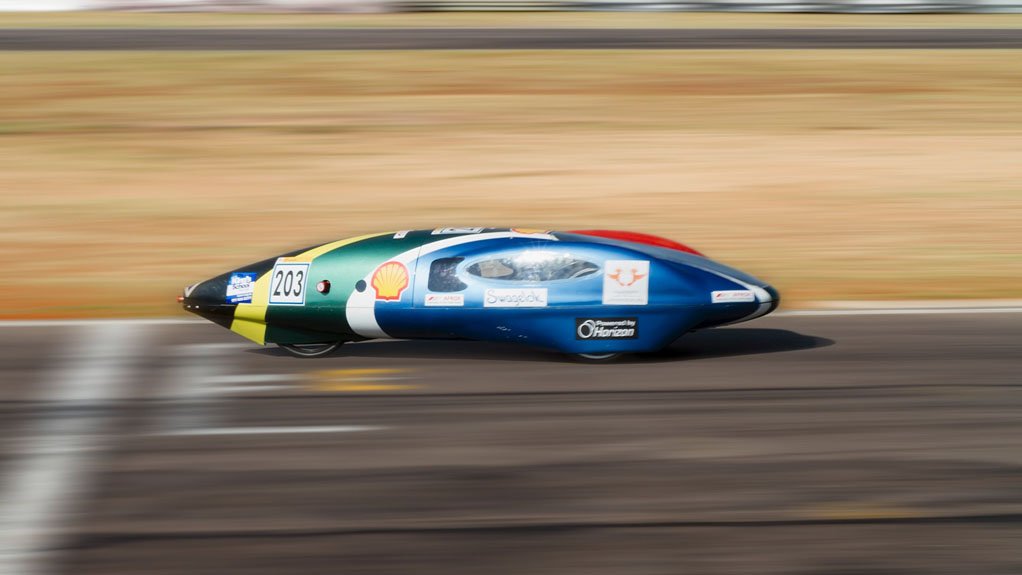In a bid to allow South African engineering students to explore and understand energy efficiency and solutions, Gauteng-based tertiary institution the University of Johannesburg (UJ) has partnered with international energy and petrochemicals group Shell Global for the fourth time to host the annual Shell Eco-Marathon competition.
The Eco-Marathon, which took place on October 21 and 22 at the Zwartkops raceway, in Pretoria, challenged students from around the world to design, build and drive energy efficient cars. The competition focuses on distance rather than speed, with the team whose car can go the furthest distance on the least amount of energy deemed the winner, explains UJ School of Electrical Engineering head Professor Johan Meyer.
He explains that the marathon comprises different energy categories, namely internal combustion engines, battery electric vehicles and hydrogen fuel cell-supplied energy.
Internal combustion engines, made up of petrol and diesel-powered cars, required teams to fill a small glass with diesel or petrol to an accurate level before the race. When the laps were completed, the car was filled up with fuel again to measure how much fuel was used in those 10 km.
In the case of the fuel cell category, there is a special device that combines hydrogen and oxygen, which produces electricity. Cars are equipped with a small cylinder of hydrogen. Energy used on the track is expressed in kilometres per cubic metre of hydrogen.
Battery-powered cars have on-board batteries, which supply an energy meter called a joule meter, which is able to measure the amount of energy consumed.
Each of the 17 participating teams was required to do a minimum of 10 km, or four laps around the Zwartkops track at a minimum speed of 25 km/h.
“Last year, South Africa’s fuel cell car ranked eighth globally, enthuses Meyer. The fuel cell-supplied vehicle travelled 317 km on one cubic metre of hydrogen. Being able to travel a significant distance on less than 100 g of hydrogen is what makes this competition so exciting,” Meyer motivates.
Benefiting South African Students
Meyer says UJ’s passion in participating in the marathon comes from wanting to motivate and stimulate its students with a real-life challenge. “It’s different than writing something on a piece of paper. If your car doesn’t run, that’s it – 50% is not good enough.”
He adds that students compete against themselves and other international teams, which allows them to form partnerships, network and pursue research and development opportunities. “The Eco-Marathon gives us an opportunity to engage with industry and other teams with different industry partners and sponsors. It helps our students to get plugged into the industry.”
The marathon is not just about building cars, but also about stimulating practical and creative engineering thought, while simultaneously building an awareness of energy efficient thinking and getting hands-on experience, says Meyer.
He points to competitions such as the Eco-Marathon playing a role in bridging South Africa’s current skills gap. He says, with engineering being one of the scarcest skills in the country, the more industry can attempt to stimulate and develop interests in engineering, the more tertiary institutions can educate students to become engineers that will ultimately make a difference to the country’s energy needs.
A number of high schools are also eligible to participate, which fosters an emphasis on building science, technology, economics and mathematical skills at a high school level.
“Initiatives such as these demonstrate commitment to harbouring young and dynamic talent displayed by learners and students who are dedicated to tackling the energy challenge. The event also serves as an ideal ground to attract and capture young people’s interest in the fields of science, technology and engineering,” Meyer says.
The Shell Eco-Marathon does emphasise technical aspects, but also allows for students to explore other skill sets, such as how to pitch an idea to raise funds and get sponsorships, and how to speak to people and teammates. Meyer believes this is integral to grooming students to graduate with practical experience of different skills in the engineering industry, both soft and technical.
Students, in turn, have an opportunity to broaden their mindsets regarding energy efficiency awareness. “They get a view outside the fence of UJ, and engage with industry to learn skill sets, which I believe makes them more well-rounded engineers. They also get to understand that there is an energy crisis, and can gear their solutions towards addressing it, once thinking differently about it,” he concludes.
Edited by: Zandile Mavuso
Creamer Media Senior Deputy Editor: Features
EMAIL THIS ARTICLE SAVE THIS ARTICLE
ARTICLE ENQUIRY
To subscribe email subscriptions@creamermedia.co.za or click here
To advertise email advertising@creamermedia.co.za or click here













